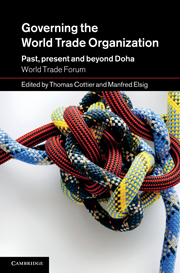Book contents
- Frontmatter
- Contents
- List of figures
- List of tables
- Notes on Contributors
- Preface
- List of abbreviations
- 1 Introduction
- PART I Setting the stage
- PART II Boundaries
- 4 Internal measures in the multilateral trading system: where are the borders of the WTO agenda?
- 5 Legitimising global economic governance through transnational parliamentarisation: how far have we come? How much further must we go?
- PART III Emerging and established powers
- PART IV Weaker actors
- PART V The consensus principle
- PART VI Quo vadis?
- Index
- References
5 - Legitimising global economic governance through transnational parliamentarisation: how far have we come? How much further must we go?
Published online by Cambridge University Press: 07 September 2011
- Frontmatter
- Contents
- List of figures
- List of tables
- Notes on Contributors
- Preface
- List of abbreviations
- 1 Introduction
- PART I Setting the stage
- PART II Boundaries
- 4 Internal measures in the multilateral trading system: where are the borders of the WTO agenda?
- 5 Legitimising global economic governance through transnational parliamentarisation: how far have we come? How much further must we go?
- PART III Emerging and established powers
- PART IV Weaker actors
- PART V The consensus principle
- PART VI Quo vadis?
- Index
- References
Summary
Introduction
The debate about the legitimacy deficit of the World Trade Organization (WTO) and of other international economic institutions forms a core element of the legal and political discourse about global economic governance (Esty 2002: 7; Nye 2003). Parliamentary and civil society interest in and engagement with issues of global economic governance continue to flourish. Questions about legitimacy and democratisation will also remain a prominent element of the debate about the institutional structure and the reform of the decision-making processes of global economic institutions.
This chapter aims to contribute to this debate by analysing the potential role of transnational parliamentary institutions and framing this analysis in the wider debate about democratic legitimacy at the international level. The chapter is organised in five main sections. The first section identifies different usages of the key notions of legitimacy and democracy and relates them to each other. Based on this, a framework for the analysis of the potential of transnational parliamentarisation as a means of reducing the democratic deficit of global economic governance is developed. Transnational parliamentarisation is explained in the next section, as the growing trend of parliamentary activities beyond the nation state. This involves the proliferation of parliamentary assemblies in various regional settings and the emergence of less formal parliamentary dimensions of global economic governance. The third and fourth sections of the chapter discuss the Parliamentary Conference on the WTO (PCWTO) and the Parliamentary Network on the World Bank (PNoWB), as two recent examples of transnational parliamentarisation.
- Type
- Chapter
- Information
- Governing the World Trade OrganizationPast, Present and Beyond Doha, pp. 82 - 108Publisher: Cambridge University PressPrint publication year: 2011
References
- 1
- Cited by

